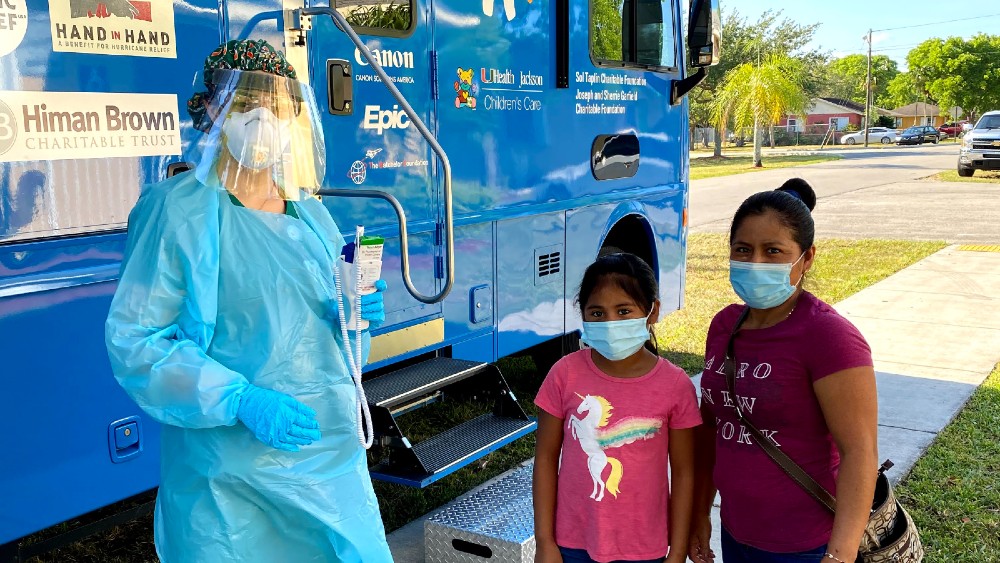The United States has not seen wide-sweeping immigration legislation in 35 years. Meanwhile, unaccompanied children and youth, seeking refuge from violence and poverty in their home countries, continue making the long, arduous journey to the U.S.-Mexico border. Children often arrive with health issues that need immediate attention, after these dangerous crossings. The federal government is rushing to keep up with the growing numbers, and Children’s Health Fund wants to see a clear and comprehensive response tailored to these children’s unique needs.
All children need access to healthcare regardless of immigration status. Children’s Health Fund (CHF) is in favor of policy change focused on the health and wellbeing of all children whether they arrive at the U.S.-Mexico border, or are living in mixed-status households. These children and families deserve care that is sensitive to their needs.
Immigrant Children and Healthcare Needs
Children of immigrants and refugees face specific barriers to healthcare access:
- Children of immigrants are less likely to have a source of regular, consistent medical care and are less likely to obtain specialty care when needed;
- Children of immigrants are almost twice as likely to be uninsured as are children in non-immigrant families;
- Immigrant children are more likely to live at or below the poverty line than non-immigrant children; and
- Immigrant children face barriers to accessing programs designed to support low-income families in under-resourced communities.
Many of CHF’s network programs care for children in immigrant communities. Some have reported an increase in the numbers of children and families in need of urgent, trauma-informed medical care after being held in detention centers for their cases to be processed.
“Our team has definitely seen an increase in kids who come over as unaccompanied minors,” said Allison Lopez, MD, FAAP, Medical Director of Dell Children’s Health Express. Dr. Lopez knows the trauma faced by these children and families and underscores the need for subspecialist care for children with special healthcare needs, mental health services, legal services, and basic necessities such as housing and food. For kids and families like those served by Dr. Lopez’s program, resource navigation can be a major hurdle to accessing basic necessities that are available.
Immigrant children, especially those traveling across the border without their caregivers, have unique health needs and are more likely to have experienced trauma such as:
- Family separation and separation from parents and caregivers due to immigration enforcement which can lead to housing and food insecurity;
- Living in fear of a parent or family member facing deportation without notice;
- Abuse, exploitation, and serious trauma (specifically children who have crossed the border and refugee children); and
- The hardships faced on the journey to the U.S.-Mexico border, including hunger, violence, and more.
Children arriving at the border are in need of trauma-informed care, not only when they enter the United States but over the long term.
National Policy Response
The pandemic has made it clear that immigrant children and families face unjust barriers to healthcare. CHF is in support of the Health Equity and Access Under the Law (HEAL) for Immigrant Families Act which would restore and expand health insurance coverage for immigrant children and families. It would remove the existing five-year waiting period for Medicaid and Children’s Health Insurance Program (CHIP) eligibility and make the Affordable Care Act’s (ACA) marketplaces available for DACA recipients and undocumented immigrants.
Some other efforts at immigration reform are in the works. We are encouraged by the passage of H.R. 6, the American Dream and Promise Act which provides a pathway to citizenship for DREAMers in addition to those with Temporary Protected Status (TPS) and Deferred Enforced Departure (DED) status.
President Biden sent immigration legislation to Congress on the first day of his presidency, which immediately caught widespread attention because it undid many of former President Trump’s executive actions. The U.S. Citizenship Act, introduced by congressional Democrats earlier this year, would result in major changes to the immigration, visa, and border control systems and provide a pathway to citizenship for the estimated 11 million undocumented immigrants living in the United States, including children. We hope that a bipartisan agreement can be reached to ensure that immigrant children and children living in mixed-status families can access equitable, comprehensive, and affordable health programs.
Children’s Health Fund is working toward a future where all children can reach their full potential, with access to high-quality healthcare and all other essential services that they need to thrive. We believe immigration reform is critical to children’s current and future wellbeing.








